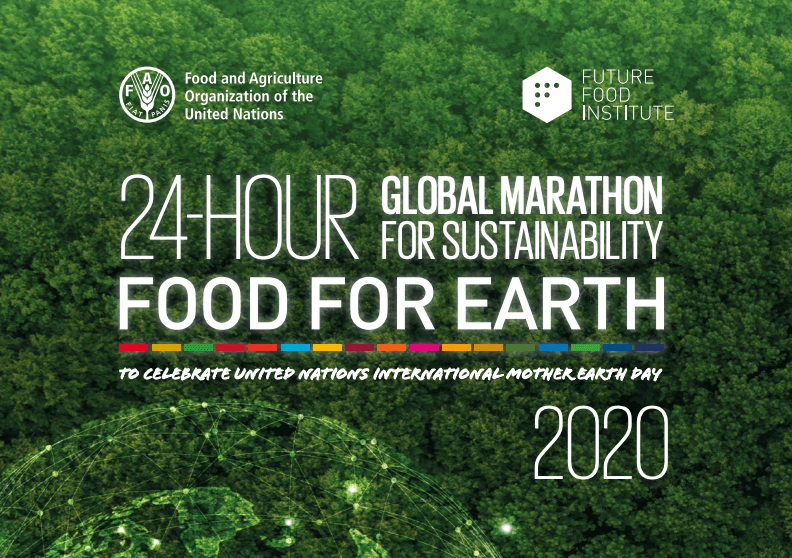#FOOD4EARTH. The 24h Marathon on #EARTHDAY. The largest lesson on sustainable food systems.
The Future Food Institute and the Food and Agriculture Organization of the United Nations
24-Hour Earth Day Marathon on Sustainability: Food for Earth
On 22 April 2020, to celebrate the 50th anniversary of the United Nations Earth Day, the Future Food Institute and the FAO elearning Academy (Food and Agriculture Organization of the United Nations) organized a Global 24-hour Digital Marathon on Sustainability entitled: “Food for Earth”. The global event brought together bright minds and best practices on sustainable food systems for regenerating the Planet.
This knowledge sharing experience, fully aligned with the UN Sustainable Development Goals framework, was human and nature-centred and reflects the shift from design-thinking to prosperity-thinking, by placing nature back at the centre of our lives.
This relay of positivity and goodness, like an ideal Olympic torch, travelled from East to West, passing from indigenous people that reflect the identity of entire territories to entrepreneurs, startups, scientists, journalists, young leaders, policymakers, consultants, farmers. The torch passed from China to Japan, India, Middle East, Russia, Europe, Africa, Latin America, North America and even the North and South Poles, as we connected with scientists at the Concordia Station in Antarctica.
Sweeping across the world from East to West, the FFI/FAO elearning Academy Global Marathon is the largest worldwide lesson on the regenerative power of food systems ever broadcasted, bringing together more than 100 expert voices, speaking to the importance of sustainable food systems in the regeneration of the planet, with 24 main work sessions, in English, Chinese, French and Spanish, more than 100,000 views worldwide, more than 10,000 social media shares and each session counting an average of about 6,000 followers.
The lessons learnt during the Global Marathon can be summarized into three categories: Planet, People, Prosperity.
From a Planet and environmental perspective, the future of food systems need to:
- stop overexploiting natural resources,
- bring back farmers to the centre of our relationship with food, as the guardians of the land,
- embrace circularity
- stop the unnecessary wastage of food and water, that accelerates climate change and biodiversity loss and in turn, promotes pandemics and threatens global food security.
From the human perspective, the identified lessons related to cooks and food experiences, underlining the role of food, as a medicine and care, as well as identity, tradition and culture, sustainable diets for nourishing health, and the pivotal role of education in the kitchens, that has increasingly become our classroom and a nexus between peace and food security.
The third category is prosperity, with the key learnings focused on the importance of our “core values” in innovation, such as reciprocity, active listening, solidarity, empathy and collaborative leadership. Values have the ability to connect different actors in the world of innovation from supply to demand. Prosperity is achieved by developing systemic thinking, as everything on Earth is closely interconnected. To truly solve global challenges we must learn to develop a holistic approach that considers plants, animals and their shared environment: one Planet, one Welfare and one Health are pivotal concepts to embrace a systemic vision of food.
Finally, from this perspective we need to promote the caring economy: the post-Covid-19 era will be focused on the necessity to care for one another. This care must become a currency in the economic equation.
Sara Roversi, Founder of the Future Food Institute, said, “The lessons learnt during Food for Earth Day are the basis for rethinking business as usual because business as usual is part of the problem. To achieve this we need systemic thinking, multi-stakeholder platforms and multidisciplinary profiles. In this sense, the marathon has represented a unique example both of extraordinary content that now is becoming a book and of the power of partnership between the public and private sector to contribute to new, circular and regenerative practices”.
Education is the most relevant lever to reshape food systems. In this regard, the Future Food Academy and FAO eLearning Academy are developing an innovative formula for O2O (online to offline) learning experiences, through the design of International Bootcamps, that are available on https://futurefood.academy/. Bootcamps are focused on climate-smart cities, farms, oceans and regenerative kitchens.
The content generated from the Global Marathon and the wealth of FAO elearning courses, offered as a global public good, through the FAO elearning Academy will form the basis of the learning programmes offered by these Academies for the future “Climate Shapers”.

